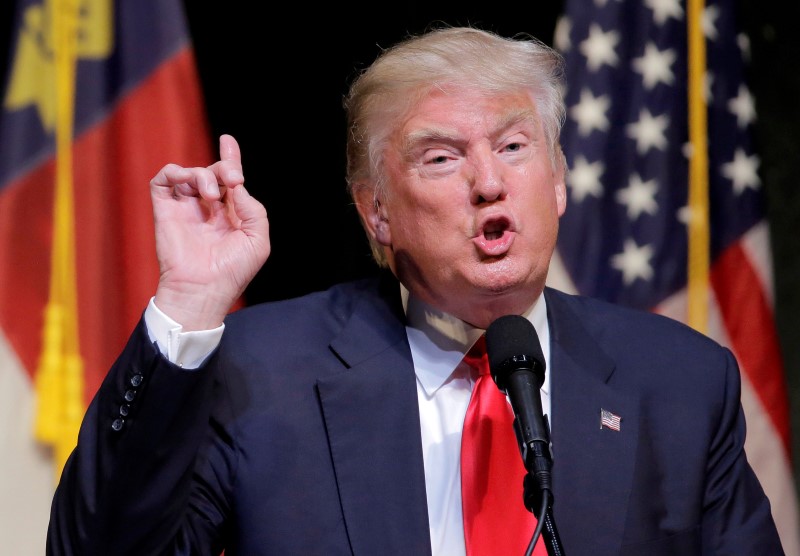(Adds business leaders seeking meeting with Trump, paragraphs6-7)
By Susan Cornwell and Ayesha Rascoe
WASHINGTON, March 5 (Reuters) - U.S. President Donald Trumpfaced growing pressure on Monday from political and diplomaticallies as well as U.S. companies urging him to pull back fromproposed steel and aluminum tariffs, although he said he wouldstick to his guns.
Inside the White House, there still appeared to be confusionabout the timing and extent of the planned tariffs, which wouldhit allies like Canada and Mexico hard.
Efforts by Trump and U.S. trade negotiators to link theNAFTA trade pact talks to the duties received short shrift fromOttawa and Mexico City. Republicans turned up the pressure on Trump, withHouse of Representatives Speaker Paul Ryan leading the charge.Ryan's home state of Wisconsin would be hit by proposed Europeancounter-measures on Harley-Davidson Inc (NYSE:HOG) HOG.N motorbikes. Kevin Brady, another top House Republican,called on Trump not to hit America's closest allies. leaders are pressing for a meeting with Trump tobrief him on the negative repercussions of the tariffs oncompanies that use steel and aluminum, a source familiar withthe matter said.
A meeting had not yet been set up, the source said. TheWhite House had no comment.
The planned tariffs have roiled world stock markets asinvestors worried about the prospect of an escalating trade warthat would derail global economic growth. Stocks across theglobe rose on Monday, however, after four days in decline asinvestors saw the tariff threats as a U.S. negotiating tacticand not a done deal and as pressure grew on Trump to back off. not backing down," Trump said during a White Housemeeting with Israeli Prime Minister Benjamin Netanyahu. "I don'tthink you're going to have a trade war," he added, withoutelaborating. Prime Minister Justin Trudeau called Trump onMonday to tell him the tariffs would be an impediment to talkson updating NAFTA, a Canadian government official said.
Canada is the single largest supplier of steel and aluminumto the United States. In the call, Trudeau "forcefully defended"Canadian workers and industries, said the official, describingthe conversation as constructive. comments from Trump had stoked talk of a globaltrade war as he described them as easy to win and issued athreat to German carmakers. One of those, BMW BMWG.DE , runs aplant in the United States that is the largest single autosexporter in the country and has created thousands of jobs.
Most responses to Trump's proposed tariffs have beentargeted. The European Union said it would hit Harleys, bourbonand jeans, iconic American products. It did not threaten to rampup the issue.
China has been largely mum, urging caution, and both Canadaand Mexico have stressed the targeted nature of any response.
STRESSES INSIDE THE WHITE HOUSE?
Trump was expected to finalize the planned tariffs later inthe week, although some observers familiar with the process saidit could occur next week. The initial announcement by Trump lastweek came as a surprise.
The United States, Mexico and Canada have been holding talksover changes to the North American Free Trade Agreement, a pactthat Trump has threatened to abandon.
Six months of tense talks have produced little in the way ofprogress and a move by Washington to link the steel and aluminumtariffs to progress on NAFTA was rebuffed by Canada and Mexico.
U.S. Trade Representative Robert Lighthizer also attemptedto drive a wedge between Canada and Mexico when he suggested theUnited States would be willing to hold bilateral, rather thantrilateral talks. The two countries again stood firm.
In Washington, aides scrambled to meet Trump's demand forthe paperwork to be completed for a formal announcement. Theexact timing was unclear as the tariff documentation had to bedrafted and go through a variety of reviews, a process thattakes days, an administration official said.
There was always a chance that Trump ”could amend hisinitial announcement” to take account of the concerns expressedabout it, said a source familiar with the internal debate at theWhite House.
TRUMP'S TRADE TRAIL
Trump has frequently talked tough on trade, although hisactions have not always matched his words. On his first day inoffice in January 2017, he withdrew from the 14-nation TransPacific Partnership agreement, a deal that was dead on arrivalin the U.S. Congress in any case.
He has frequently tweeted and said that he would pull out ofNAFTA, which he has called a jobs killer. But a year aftertaking office, the 1994 deal remains intact.
Trump has approved a series of small-scale trade actions, ofwhich the steel and aluminum duties would be a part. Takentogether with actions on washing machines and solar panels, theproposed move accounts for just 4.1 percent of U.S. imports. Interms of global trade, they are just 0.6 percent, investmentbank Morgan Stanley (NYSE:MS) said in a report. head of the World Trade Organization warned of a realrisk of triggering an escalation of global trade barriers and adeep recession, even as financial markets and many economistsstarted to discount the risk of a global crisis.
"We must make every effort to avoid the fall of the firstdominoes. There is still time," WTO Director General RobertoAzevedo told the heads of WTO delegations at a closed-doormeeting in Geneva. -Trump's extraordinary tariffs
steel hand grenade may only blow himself up, ifno more are lobbed: Russell
trade tariffs: Long on rhetoric, short onimpact?
